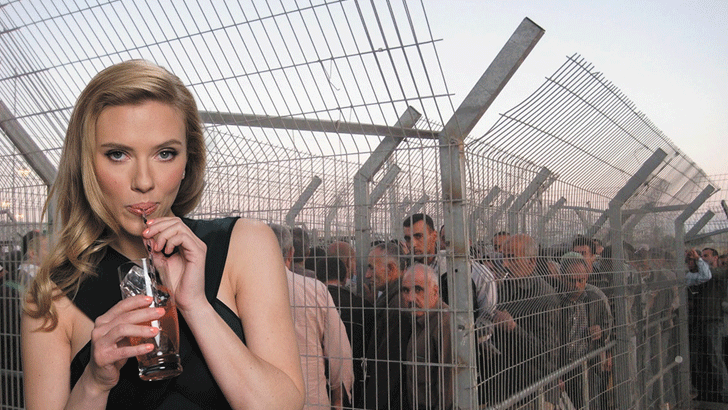You can’t glam up apartheid

Scarlett Johansson is the new face of apartheid. Her very public decision to quit Oxfam and continue her role as Sodastream’s “global brand ambassador” is appallingly racist. Here’s why.
Sodastream operates a factory in the Mishor Adumim Industrial Zone, which is located on stolen Palestinian land in the occupied West Bank. The company not only profits from the stolen land but also exploits Palestinian labour.
“Palestinian workers in this factory always feel like we are enslaved … There is a full discrimination against the [Muslim] workers and we are denied our right to practice our religion”, explained one employee last year to the online news site Electronic Intifada.
Johansson’s endorsement of Sodastream helps to legitimise the company’s operations. It also helps to legitimise Israel’s ongoing ethnic cleansing and apartheid practices.
There are differences between the regime that existed in South Africa and that of Israel today. But the similarities speak for themselves. South Africa made a legal distinction between “white”, “coloured”, “Indian” and “black”. Israel makes a legal distinction between “Jew” and “non-Jew”.
Israel’s Population Registry Law of 1965, which requires all residents to register their nationality, is very similar to South Africa’s apartheid-era Population Registration Act, which categorised people in order to determine who could live in particular areas.
A “matrix of control” exists in the occupied territories, which consists of Jewish-only settlements, an obstructive ID system, segregated buses and separate roads for Israeli citizens. All of this amounts to intensive restrictions on the movement of Palestinians.
Israeli apartheid, like the South African variety, mounts an ongoing campaign of violent demographic engineering against the indigenous population. Palestinians are subject to regular curfew and cannot leave or enter their own towns without permits. Under Israel’s military apartheid regime, Palestinians’ water resources, land and crops are regularly confiscated and their homes destroyed.
All this debunks the commonly touted claim that Israel is the only democracy in the Middle East. Alongside the restrictions on movement and the ever present eye of the military, Israel will not allow Palestinians in the occupied territories to vote. Their very existence is deemed a threat, so the idea of “one person one vote” is maligned as anti-Semitic!
The Palestinian Prisoner Support and Human Rights Association estimates that since 1967, 40 percent of the male Palestinian population in the occupied territories has been imprisoned. According to both Israeli and Palestinian human rights organisations, nearly all Palestinian political prisoners have suffered torture.
John Dugard, former special rapporteur to the UN Human Rights Council, in 2011 compared the Israeli imprisonment of Palestinians to policies of apartheid-era South Africa. “Apartheid’s security police practiced torture on a large scale”, he wrote in an article for Al Jazeera. “So do the Israeli security forces. There were many political prisoners on Robben Island [the prison that housed Nelson Mandela] but there are more Palestinian political prisoners in Israeli jails.”
Palestinians, like Black South Africans before them, have resisted this subjugation both inside the racist regime and internationally. That’s what makes Johansson’s decision all the more repulsive.
Palestinians have been pleading for solidarity for years and an international campaign – the boycott, divestment and sanctions movement – has continually exposed the criminality of companies like Sodastream that benefit from Israeli apartheid.
For Johansson, none of that matters. If this had been South Africa in the 1980s, would she have acted in a similar way?
[For more on contemporary Middle Eastern politics, come and hear scholar Gilbert Achcar speak at Marxism 2014.]